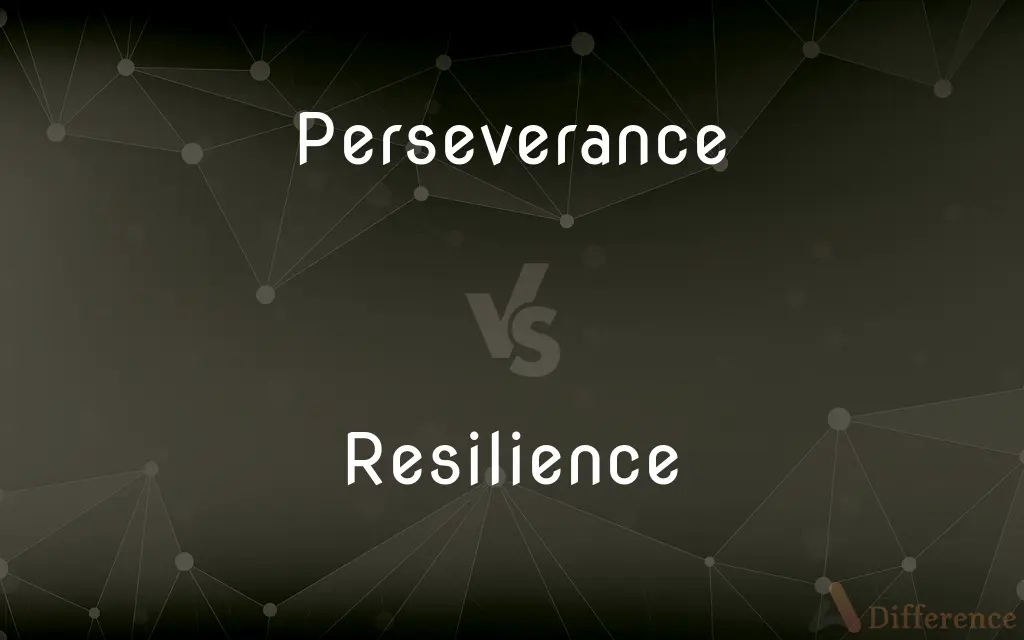Perseverance vs. Resilience — What's the Difference?
By Urooj Arif & Maham Liaqat — Updated on March 7, 2024
Perseverance refers to the steadfast persistence in doing something despite difficulties or delay in achieving success, while resilience is the capacity to recover quickly from difficulties or setbacks.

Difference Between Perseverance and Resilience
Table of Contents
ADVERTISEMENT
Key Differences
Perseverance embodies the concept of continuous effort and determination in the pursuit of a goal or task, even in the face of obstacles, challenges, or prolonged periods of effort without immediate success. Resilience, on the other hand, highlights the ability to bounce back from adversity, trauma, or stress. It's not just about enduring a difficult situation but also about adapting and growing stronger in the face of challenges.
While perseverance focuses on the action of persisting and the endurance to continue despite challenges, resilience is more about the capacity for recovery and adaptation following a setback. Perseverance is about the journey and the sustained effort required to overcome obstacles, whereas resilience is about how one deals with and recovers from those obstacles.
Both qualities are essential for overcoming life's challenges, but they function differently. Perseverance is crucial for achieving long-term goals, requiring continuous effort and determination, while resilience is key to dealing with immediate setbacks, enabling quick recovery and adaptation to new circumstances.
Understanding the interplay between perseverance and resilience can provide a deeper insight into personal growth and success. While perseverance pushes an individual to keep going, resilience ensures they can handle the setbacks encountered along the way, making both qualities vital for achieving objectives and maintaining well-being.
Comparison Chart
Definition
Steadfast persistence in doing something despite difficulties or delays.
The capacity to recover quickly from difficulties or setbacks.
ADVERTISEMENT
Focus
On continuous effort and determination to achieve a goal.
On recovery, adaptation, and growth from adversity.
Key Element
Persistence and sustained effort.
Recovery and adaptability.
Role
Essential for achieving long-term goals and overcoming prolonged challenges.
Crucial for dealing with immediate setbacks and adapting to change.
Outcome
Achievement of objectives through relentless effort.
Quick recovery and stronger comeback after facing challenges.
Compare with Definitions
Perseverance
Important in long-term goals and projects requiring sustained effort.
The team's perseverance was key in completing the project on time.
Resilience
The ability to recover quickly from setbacks or adversity.
Her resilience after the business failure was inspiring.
Perseverance
Continuous effort to achieve something despite difficulties.
His perseverance led him to complete the marathon despite the injury.
Resilience
Key in responding to and overcoming immediate challenges.
His resilience helped him cope with the loss and move forward.
Perseverance
Can involve facing repeated obstacles and failures.
Despite numerous rejections, he persevered in his job search.
Resilience
Involves adaptability, recovery, and emotional strength.
The community showed resilience in the aftermath of the natural disaster.
Perseverance
Involves persistence, determination, and sustained effort.
Her perseverance in her studies resulted in academic success.
Resilience
Results in personal growth and stronger comeback after difficulties.
The athlete's resilience led to a successful comeback after the injury.
Perseverance
Leads to achieving goals through relentless effort and determination.
Their perseverance paid off when they won the championship.
Resilience
Involves bouncing back from failures, trauma, or stress.
They demonstrated resilience by rebuilding their lives after the crisis.
Perseverance
Steady persistence in adhering to a course of action, a belief, or a purpose; steadfastness.
Resilience
The capacity to recover quickly from difficulties; toughness
The often remarkable resilience of so many British institutions
Perseverance
(Christianity) The Calvinistic doctrine that those who have been chosen by God will continue in a state of grace to the end and will finally be saved.
Resilience
The ability of a substance or object to spring back into shape; elasticity
Nylon is excellent in wearability, abrasion resistance and resilience
Perseverance
Continuing in a course of action without regard to discouragement, opposition or previous failure.
Resilience
The ability to recover quickly from illness, change, or misfortune; buoyancy.
Perseverance
The act of persevering; persistence in anything undertaken; continued pursuit or prosecution of any business, or enterprise begun.
Whose constant perseverance overcameWhate'er his cruel malice could invent.
Resilience
The property of a material that enables it to resume its original shape or position after being bent, stretched, or compressed; elasticity.
Perseverance
Discrimination.
Resilience
The mental ability to recover quickly from depression, illness or misfortune.
Perseverance
Continuance in a state of grace until it is succeeded by a state of glory; sometimes called final perseverance, and the perseverance of the saints. See Calvinism.
Resilience
(physics) The physical property of material that can resume its shape after being stretched or deformed; elasticity.
Perseverance
Persistent determination
Resilience
The positive capacity of an organizational system or company to adapt and return to equilibrium after a crisis, failure or any kind of disruption, including: an outage, natural disasters, man-made disasters, terrorism, or similar (particularly IT systems, archives).
Perseverance
The act of persisting or persevering; continuing or repeating behavior;
His perseveration continued to the point where it was no longer appropriate
Resilience
The capacity to resist destruction or defeat, especially when under extreme pressure.
Resilience
The act of springing back, rebounding, or resiling; as, the resilience of a ball or of sound.
Resilience
The power or inherent property of returning to the form from which a substance is bent, stretched, compressed, or twisted; elasticity[1]; springiness; - of objects and substances.
Resilience
The power or ability to recover quickly from a setback, depression, illness, overwork or other adversity; buoyancy; elasticity[2]; - of people.
Resilience
The mechanical work required to strain an elastic body, as a deflected beam, stretched spring, etc., to the elastic limit; also, the work performed by the body in recovering from such strain.
Resilience
The physical property of a material that can return to its original shape or position after deformation that does not exceed its elastic limit
Resilience
An occurrence of rebounding or springing back
Common Curiosities
How do perseverance and resilience complement each other?
Perseverance allows individuals to continue striving towards their goals, while resilience helps them recover and learn from the setbacks encountered along the way.
Can too much perseverance be harmful?
Excessive perseverance without flexibility or adaptability can lead to burnout or continued effort in futile directions; balance is key.
How does resilience affect mental health?
Strong resilience can protect against mental health issues by enhancing one's ability to cope with stress and adversity.
Can failure strengthen both perseverance and resilience?
Yes, dealing with failure in a constructive way can strengthen perseverance by reinforcing determination and resilience by improving coping mechanisms.
Is it possible to be resilient without being perseverant?
Yes, one can quickly recover from a setback (resilience) without necessarily engaging in a prolonged effort towards a goal (perseverance).
Can perseverance lead to resilience?
Yes, the act of persisting through challenges can build resilience by fostering emotional and mental strength.
Is resilience innate, or can it be developed?
While some people might naturally be more resilient, resilience can certainly be developed through experiences and coping strategies.
Are there any practices to enhance resilience?
Mindfulness, cognitive restructuring to view challenges as opportunities, and building a strong support network can enhance resilience.
How can one build perseverance?
Setting clear goals, maintaining a positive outlook, and focusing on incremental progress can help build perseverance.
How do cultural factors influence perseverance and resilience?
Cultural values and societal norms can shape how individuals view and respond to challenges, thereby influencing their perseverance and resilience.
Share Your Discovery

Previous Comparison
Aim vs. Intention
Next Comparison
Aim vs. ImportantAuthor Spotlight
Written by
Urooj ArifUrooj is a skilled content writer at Ask Difference, known for her exceptional ability to simplify complex topics into engaging and informative content. With a passion for research and a flair for clear, concise writing, she consistently delivers articles that resonate with our diverse audience.
Co-written by
Maham Liaqat













































